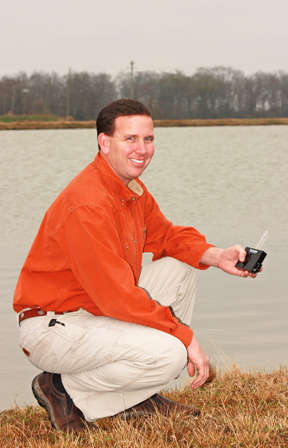Catfish Farmer Of The Year Thinks Beyond The Pond Bank

Travis Wilson of Dallas County said he probably wasn’t chosen Alabama’s Catfish Farmer of the Year because he thinks outside the box. More likely, he said, it’s because he and his family think beyond the pond bank.Travis was recognized during the annual Catfish Farmers of America meeting in Mobile in February, but it’s what he and his family do on their farm each day that earned him the award. The farm is known for utilizing, and even inventing, some of the latest technology for catfish production.The Alabama Catfish Producers, a division of the Alabama Farmers Federation, selected Travis earlier this year as the nominee, which was confirmed by the Catfish Farmers of America. Federation Catfish Division Director Mitt Walker said Travis was chosen for the award for his environmental stewardship, production, innovations and leadership.”We are blessed to have clean fresh water and a good clay-based soil,” said Wilson, who grows catfish with his father, Butch Wilson, and his brother-in-law, Willard Powe. Their ponds cover 450 acres just west of Selma. “Without good water quality, you won’t be successful in the catfish industry.”I think I owe whatever success I have to my father who has always been willing to try new things. We’ve done lots of research with Auburn University to help improve the way we do things. Some of it has worked, and others, well, we know now that they won’t work.”As Alabama’s Catfish Farmer of the Year, Travis will represent the state this March at the Boston Seafood Show, the nation’s largest seafood show. He also will appear in promotional advertising for the Catfish Farmers of America.Travis, 37, grew up farming with his dad on their 1,750-acre farm where they also raise beef cattle. His dad began raising catfish in 1990 and when Travis finished college, he returned home to the family’s business, as did his brother-in-law. The farm typically produces about 3 million pounds of catfish a year.
Married for 10 years, Travis and his wife, Keisha, have two sons, Trevor, 8, and Cole, 6.”One of the best attributes of being a farmer is being with your family most of the time,” he said. “I like the fact that my sons are growing up the same way I did. It allows me to instill my principles and values in them every day.”Catfish production brings a certain pioneer spirit to agriculture, according to Travis, who described his dad as “a man of dreams.” Some of those dreams have turned into experiments that are helping revolutionize the industry.In addition to the traditional ponds, their farm includes a raceway system where catfish are grown in a confined area of a pond with special attention paid to feed consumption, water quality and waste management. By focusing on a smaller area of the pond with a larger number of fish, the feed conversion, which equates to higher profits, increases as well.The latest addition to the farm is a 120- by 80-foot insulated barn, built with the help of a soybean checkoff grant from the United Soybean Board. The barn holds 10 large fish tanks. The tanks have the capacity to raise 100,000 pounds of tilapia every six months with a filtered water system.”Soybeans are a large component of fish food and if we can increase fish production inside barns like this, then we would create more demand for their product (soybeans),” Travis said. “We’re growing tilapia in the tanks right now, but we are interested in fine-tuning the system so that we can raise our catfish fingerlings year round and have them bigger when we are ready to put them in the ponds.”The barn’s wastewater provides nutrient-enriched, liquid fertilizer that flows into a new greenhouse next to the barn where hydroponic lettuce is grown for a budding organic market.
“Trying new things is what has kept our farm afloat when a lot of others have left the business,” he said. “But if you’re not constantly taking care of your fish, you won’t be in the fish business long because they won’t survive.”And I want consumers to know that when they eat fish grown on our farm, they are getting a safe, delicious product grown by farmers who care about what we do.”Alabama has about 200 catfish farmers who grow fish in 19,200 acres of water. The state ranks second in the nation in catfish production, and in 2010 produced 137 million pounds of catfish valued at $106 million.
